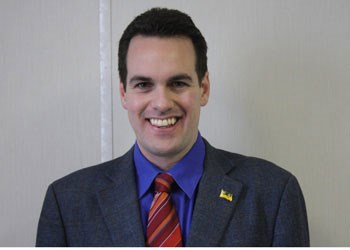The Saskatchewan NDP leadership campaign is rolling through winter, as each candidate tries to connect with voters and demonstrate how they would rebuild the party. Erin Weir is one of those candidates, and he recently spoke to The News Review about his plans for the party and the province.
Weir's history is in the economics, working for the Canadian Labour Congress, the United Steelworkers Union and the International Trade Union Confederation in Brussels. He has also been active in the party for the past 15 years, working on the legislative advisory committee from 1998 - 2000, serving as president of the Young New Democrats in 2001 and running for a federal seat in 2004.
He says that his history with economics and unions has lead him to understand that labour issues have to be handled as a public interest argument, and emphasizes why things like collective bargaining and labour issues are so important.
While the issue of royalty rates is a contentious one in the province, Weir says he is going to try to make changes in royalties to benefit Saskatchewan, and he proposes to do this by closing loopholes. He notes that, for example, potash companies can write off 120 per cent of what they invest, which he says is far too high.
"I can understand companies writing off 100 per cent of what they invest, but I'm not sure why we're giving them that extra 20 per cent, and that inflated write off alone costs $140 million dollars a year in lost revenue for the people of Saskatchewan," he notes.
He also says that incentives for horizontal drilling for oil are now out of date and unnecessary.
Weir admits that any talk of royalty rates can be contentious, but he believes that by engaging the province on the issue over a long period of time will make it possible to gain a greater understanding of the issue.
"I think one of the mistakes the NDP made was to start talking about reviewing potash royalty rates a few months before the election. I think this is a large enough issue that we should lay it out over the next three years, so we have enough time to explore it thoroughly and counter the arguments that will inevitably come from the other side."
Another change that Weir wants to see happen is a removal of corporate and union contributions to political parties. Already implemented in other provinces, he says it's a step to keep people trusting the political process, since it can appear as though parties are influenced by corporate or union contributions.
A consistent concern with candidates for the NDP leadership has been getting more female MLAs, and Weir says he has some practical approaches to make this an achievable goal. There is already the Bessie Ellis fund, which provides financial support to female candidates, and he proposes that the fund needs to be reorganized so donations receive a tax credit. Party organizers would be encouraged to actively recruit women for nominations as well. He also says that the party should take a page from the federal party, and only hold nomination meetings when they have one equity seeking candidate in the running.
Another of Weir's concerns is childcare, and he proposes that the Saskatchewan government should take a more direct approach, and establish affordable childcare spaces in schools. He says it uses existing public facilities that are set up for children, as well as being convenient for families with children of different ages. "We certainly don't want childcare expenses preventing parents from taking employment opportunities."
He is not currently in the legislature but Weir believes this is an advantage. He notes that federally, Jack Layton used his time outside of parliament to travel the country and rebuild the federal NDP, and he says he would follow that example as leader. "A big part of what we need to do to re-engage people is to give them a clear, progressive policy vision. People join the NDP because they care about issues..."




